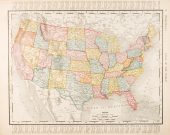Elite Rather than Popular Opinion Influences the Court
For forty years, constitutional law has been dominated by the countermajoritarian difficulty—the concern about the capacity of the Court to flout the popular will. A strong version of this critique flows from the fear that the justices follow their own policy preferences in important cases, something that seems illegitimate since they are not elected. One response to the countermajoritarian difficulty is to dispute this premise and argue that actually the Court as a whole tends in relatively short order to follow the will of the popular majority. Barry Friedman’s The Will of the People is the most recent and articulate defense of this position.
But in an excellent article in the Georgetown Law Review, Neal Devins and Larry Baum show that Supreme Court justices respond at most indirectly and very imperfectly to the majority of citizens. They look at some of the evidence, comparing the Supreme Court decisions with popular opinion. They confirm what I had long suspected: the reason that law professors have been persuaded that the Court follows popular opinion is that they confuse the will of the majority of people with the will of the majority of law professors! The Supreme Court is much more influenced by the views of elite than the people as a whole. Indeed, the justices can remain impervious to majority opinion for a very long time. The Supreme Court banned formal prayers in public schools in 1962, but decades later most people believed beginning the day with a plea for divine help would be just fine.
But the even more important part of Devins’ and Baum’s article is its demonstration of the mechanism that encourages judges to pay attention to elites. The explanation lies in social psychology. It is from elite peers that justices receive recognition, awards and praise. Given that the justices have life tenure, it is hardly a surprise that fame and fellowship will be driving forces.
Sadly, this mechanism also explains why modern justices have mostly drifted left. As others have shown, the legal profession and the legal academy in particular lean sharply left and the profession and academy are mostly in charge of the honors justices can receive.
Thus, the influences that justices face provide yet another reason that the Federalist Society is so important for the rule of law and the cause of liberty. Popular opinion will not prevent even justices appointed by Republican presidents from giving up on the principles that got them appointed. But a legal counterculture can furnish the kind of fellowship and respect that helps them resist temptation.
In a subsequent post, I will offer my own response to the countermajoritarian difficulty.

